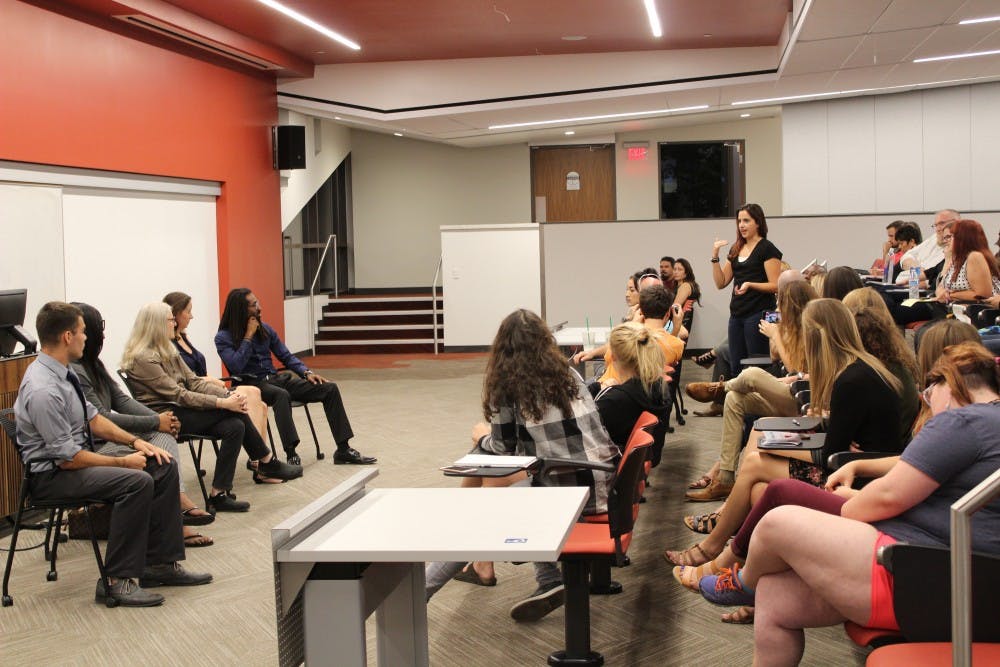A group of ASU students aims to start a dialogue about mass incarceration in the U.S.
Mission Team Seven from ASU's Next Generation Service Corps put on a panel discussion entitled "Modern Day Slavery" in collaboration with Remnant R.E.A.C.H, a nonprofit focused on supporting communities in south Phoenix, at the Beus Center for Law and Society on ASU's downtown Phoenix campus the night of Thursday, Sept. 28.
The event was open to the public, so students, faculty and members of the community were invited to attend. The audience included people who were formerly incarcerated, some with felony convictions.
The panel discussed the varying elements of the mass incarceration conversation including, race, youth education, foster care, employment and homelessness.
The panel was comprised of people from varying backgrounds, including Dr. Cornelia "Corri" Wells, an English lecturer at ASU and the head of ASU's prison education program, in which students and faculty can teach courses to prisoners.
"It’s being in an American prison," Wells said. "It’s being part of the United States. It’s living in a country that has almost 5 percent of the world’s population and 25 percent of its incarcerated people. That’s a shocking statistic.”
Brenda Combs, another panel member, was formerly incarcerated and spent ten years homeless, living under the 7th Avenue bridge in Phoenix.
Now, she has a doctorate in organizational leadership and is Grand Canyon University's “ambassador of inspiration & achievement," according to her site. She serves as an advocate for the homeless community and victims of domestic violence, speaking to crowds to inspire and encourage people to persevere.
Combs said she thinks the answer to most societal problems is just having a conversation and educating people.
"If people don't know, they can't move," Combs said. "They can't do anything. They can't make any changes."
Students' reactions not only reflected individual passion and interest, but also showed a sparked curiosity for a topic that can be intimidating to talk about.
Andrew Vigil-Emerson, a junior studying intermedia and global studies who attended Thursday's event, said his reason for being there stemmed partly from his personal interest in social activism.
“I’ve been interested in the intersection of social action and social support and how it parallels with the art community," he said. "We talked about Netflix and the representation (of prisons).”
Vigil-Emerson said he looked at the issue of mass incarceration through the lens of his major and found the conversation interesting.
“So much of social action is intersectional and interwoven, so it’s looking at how we can effect this change, and a lot of the time, it involves stepping back a little bit from our knowledge and our environment,” he said.
Shawnee Ziegler is the operations manager for the Arizona Justice Project, a nonprofit located in the Beus Center for Law and Society that seeks to free innocent people from prison.
"We're all better than our worst mistakes, and we need to start treating people like that," she said.
Panelists and students emphasized the importance of connecting with people, being more open minded and setting aside prejudices.
Jillian Ashby, a global health sophomore, said she came to support a friend in NGSC hosting the event but left with a new interest.
“(The event) sparks that fire and makes me more interested," she said. "I didn't realize that a lot of people in this room right now are felons."
Alec Warren, a sophomore economics major and the panel’s moderator, stressed the importance of creating a conversation and bringing people together to talk about the issues plaguing society.
“When we talk about something like 'Modern Day Slavery,' which is the name of this event, we mean it very literally," he said. "There is a racial caste within this criminal justice system, and that's something that we want to raise awareness about.”
Reach the reporter at madison.arnold.1@asu.edu or follow @madisonC_arnold on Twitter.
Like The State Press on Facebook and follow @statepress on Twitter.





